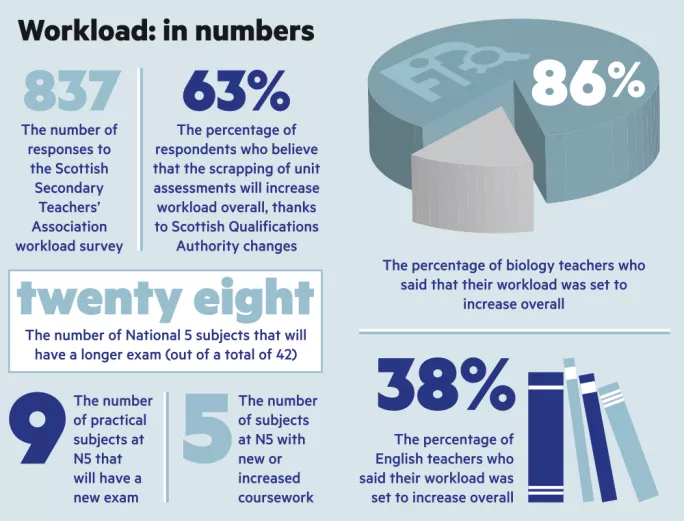Plan to cut workload ‘will only make things worse’

Nearly two-thirds of secondary teachers believe the government’s decision to scrap unit assessments to reduce workload is going to increase their burden and put more pressure on pupils, a survey seen by TESS reveals.
The move was education secretary John Swinney’s big announcement at September’s Scottish Learning Festival, when the government bowed to pressure from the teaching unions and decided to remove mandatory unit assessments at National 5 and Higher.
But a survey by the Scottish Secondary Teachers’ Association (SSTA), which received more than 800 responses in just 48 hours, suggests that 63 per cent of secondary teachers believe the removal of the mandatory units - which in most cases took place three times a year - will actually increase their workload and pupil stress. A further 18 per cent said that there would be no change to their workload.
This is because of the changes that the exam body, the Scottish Qualifications Authority, has made to coursework and examinations to compensate for the change. TESS revealed last month that 28 out of 42 N5 subjects would have a longer exam in 2017-18 because of the removal of unit assessments, while nine practical subjects would have an exam where previously none existed. The five other subjects had new or increased coursework to contend with.

The SSTA has branded the SQA changes unnecessary, saying that workload associated with unit assessments has simply been moved, not removed - and is calling for the government to carry out an urgent review.
The union is also calling for clear guidance on the use of unit assessments in schools, saying that some schools and councils are continuing to insist upon their use, adding to teachers’ and pupils’ workload woes.
Many teachers taking part in the survey commented that unit assessments were still in use so that pupils who failed the final exam had a “safety net” (see box, below).
Teachers also said that they would have to rewrite prelims to take account of changes to exams; that they faced “another two- to three-year period of chaotic change”; that coursework in some subjects had now become “monstrous” and the marks available did not reflect the huge effort required; and that some pupils in practical subjects “whose attainment has been excellent” would not cope with a written exam.
‘Monstrous’ coursework
SSTA general secretary Seamus Searson said: “It is just nonsense that we need to test everything that is on [the] course - we don’t. Teachers will teach the whole course and youngsters will go through the course but the whole point of examinations being secret is you don’t know what is going to come up. You study the whole course and get examined on three-fifths of it.
“We want an urgent review of this process, which has not taken into account teacher workload at all or the impact this will have on pupils.”
Mr Searson also called for clear guidance from the government on how unit assessments should be used in schools, because “some headteachers and councils are insisting on continuing with the unit assessments so that pupils have them if they need them” or because “they want to use them as justification for presenting at N4 or N5”.
It is just nonsense that we need to test everything that is on the course - we don’t
Jim Thewliss, general secretary of secondary heads’ association School Leaders Scotland, said that some schools were continuing to use unit assessments to monitor and track pupil progress but the picture was mixed.
“You have got to have some system there that recognises children’s achievements, whether that’s units or another system,” he said.
Larry Flanagan, general secretary of the EIS teaching union, echoed Mr Searson’s concerns about the SQA changes, saying much more had been added than had been agreed.
“Teachers are wary of the SQA changes, as is the EIS, because it would seem that much more has been added than was agreed. The fact that no detail is available, as yet, only fuels teacher concern,” he said.
“From an EIS perspective, however, we are quite clear that these changes must deliver the workload reduction that EIS members took action to secure and that the government promised to deliver.”
A Scottish government spokesperson said the removal of formal unit assessments represented “a considerable reduction in workload for teachers and young people”.
He added: “We are working with partners, including SQA and the teacher unions, to ensure that workload is reduced as a result of these changes. We will continue to engage with teachers to ensure that the changes are having the anticipated effect.”
The SQA insisted course assessments had to be strengthened “to protect the integrity, breadth and standards of National courses”.
A spokesperson said: “SQA is committed to addressing workload concerns, but must ensure that standards are maintained and that the integrity of the qualifications is protected.”
You need a Tes subscription to read this article
Subscribe now to read this article and get other subscriber-only content:
- Unlimited access to all Tes magazine content
- Exclusive subscriber-only stories
- Award-winning email newsletters
Already a subscriber? Log in
You need a subscription to read this article
Subscribe now to read this article and get other subscriber-only content, including:
- Unlimited access to all Tes magazine content
- Exclusive subscriber-only stories
- Award-winning email newsletters